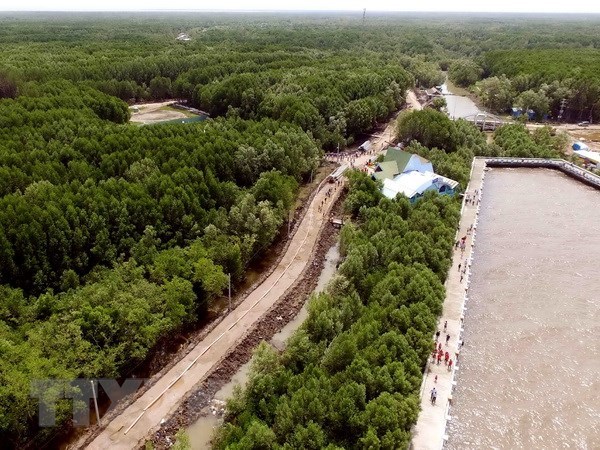[ad_1]
Vietnam has been promoting the application of high technologies in agriculture production as part of efforts to adapt to climate change and strive towards sustainable agriculture development, heard the Asia-Europe Meeting (ASEM) in Mekong Delta city of Can Tho on July 19.

Participants to the event are debating impacts caused by climate change on the regional agriculture as well as advantages and challenges of the progress towards sustainable agricultural development and adaptation to climate change in ASEM member countries.
Dr. Tang The Cuong, Director of the Department of Climate Change under the Ministry of Natural Resources and Environment stressed that Vietnam considers climate change response as a vital task as it is one of the countries hardest hit by climate change.
The Vietnamese Government has taken drastic actions in restructuring its economy, especially agricultural restructuring, in order to cope with climate change, with the most effective solution being hi-tech application.
In recent years, many technological solutions have been used in agriculture production in Vietnam, bringing effective results, Cuong said, citing as examples the production of safe vegetables in line with VietGAP standards, water-saving irrigation, hydroponic vegetable production, irradiation technology for preserving fruits, and super-intensive Tra fish farming.
Sharing Cuong’s opinion, Dr. Jan Verhagen from the Wageningen University and Research Centre of the Netherlands said his country adopted a strategy to invest in agriculture production and restructuring over the last two decades, aiming to increase productivity while reducing raw materials.
To realise the goal, the Dutch Government gave priority to improving soil quality, building canal systems and promoting mechanization, he said, noting that thanks to the investment, the Netherlands has become the second biggest exporter of agricultural products in the world despite its small area and high population density.
ASEM member economies should consider technology as a solid and decisive factor for the development of regional agriculture amid the unpredictable climate change, he suggested.
Participants said it is necessary to have regional-level cooperation projects among ASEM member countries in investing resources, transferring technique-experience, and training human resources, in order to help developing countries apply technology more effectively.
Sein Htoon Linn from Myanmar’s Ministry of Natural Resources and Environment Conversation said his country is willing to share solutions to adapting to natural disasters, which are applied effectively for its agriculture sector.
Meanwhile, Andrea Faulkner, Assistant Secretary at the Australian Department of Foreign Affairs and Trade, said her country hopes to transfer its technology in agriculture, which used dedicated remote sensing satellites to record data of soil quality, humidity, air and atmospheric pressure, helping with the analysis of changes of crops and water quality.
Recorded data will be publicised on the Internet, enabling farmers to closely monitor the development of crop, pest and other threats, thus taking appropriate interventions in right places and time, she said.
The smart cultivation model has helped Australian farmers save fuel, seeds, fertilizers, plant protection products and water, bringing high efficiency and sustainability, she noted.
Participants also said that development economies need to have incentive policies for enterprises joining hi-tech agriculture, especially private firms as they are playing a key role in investing in sustainable agriculture development and climate change adaptation.
The ASEM Conference on Climate Action to Achieving the Sustainable Development Goals – Ways Forward is one of the most important inter-regional events on climate change and the only one of ASEM 2018 hosted by Vietnam. It is an initiative of Vietnam which was approved at the 13th ASEM Ministerial Meeting last November in Myanmar and won support and sponsorship from many countries.-VNA
[ad_2]
Source link
